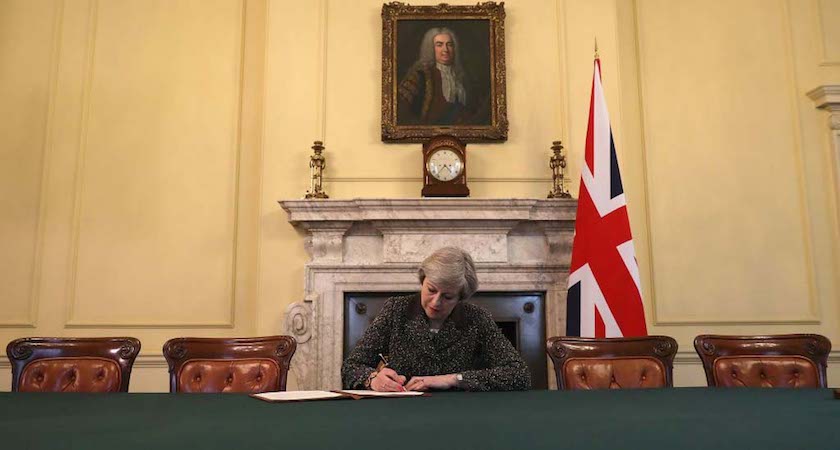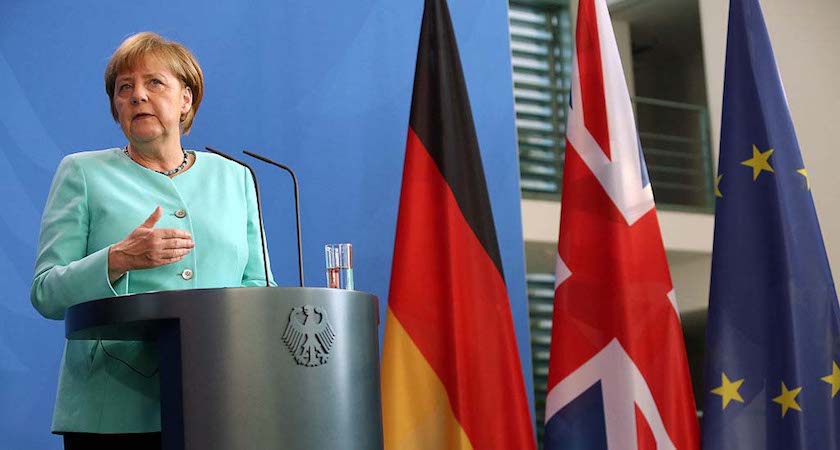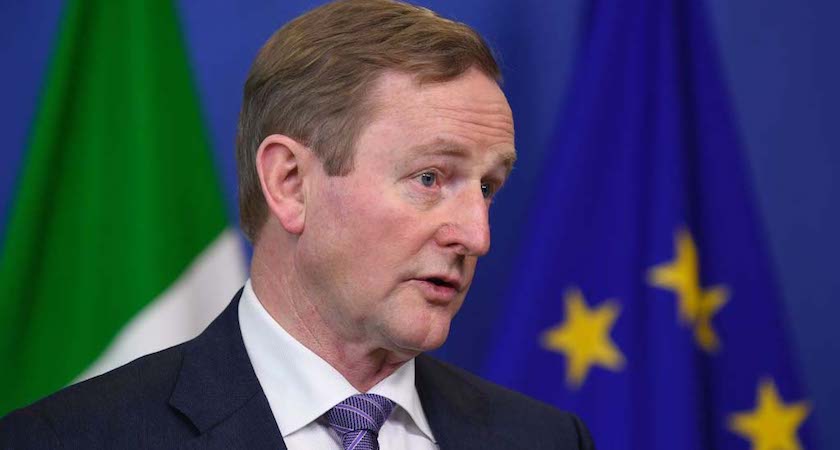THE Irish in Britain were assumed to be largely in favour of remaining in the EU, but anecdotal evidence, media reports and social media activity contradicted this starkly.
There is a long tradition in Ireland of hostility to bureaucratic, remote government, lacking in democratic accountability - and government doesn't get much less democratic, more bureaucratic or more remote than the EU.
Along with the Northern Irish electorate of some 1.2 million, over 1.7million Irish and Northern Irish people were eligible to vote.
Many of these votes - including mine - were to leave the EU.
In Ireland, last year, much of the talk was about the centenary of the 1916 rebellion, after which most of Ireland left the UK.
Here in the Britain, we had the intensity of the EU debate.
Yet both debates centred around the same fundamental issues: national independence, and the right of a sovereign people to govern itself democratically.
Both debates also hinged on whether the price of independence - be that in blood or treasure - is worth paying.
Few predicted a civil war in the event of Brexit, but many weighty political and economic figures said that our children - on both islands - would face a poorer future if the UK left the EU.
Yet the economic indicators have remained remarkably positive since the vote to leave.
The campaign to remain played upon the fears we all have for our children’s future, saying that families would be less well off in 15 years time if the UK leaves the EU.
It took real courage for over 17million voters to defy these overblown fears, in the interests of democracy. Surveys show that it was not immigration, but taking control of their own government was the primary motivation for leave voters.
I certainly voted leave as my paramount hope for my children was that they would come of age in a true, functioning democracy, where their vote really counted for something.
I did not want them to vote for the first time aged 18, only to discover that most of the laws that affect them are made by a labyrinthine EU bureaucracy over which they have no real democratic control.
 Britain's Prime Minister Theresa May signsingthe official letter to European Council President Donald Tusk, invoking Article 50 and signalling the United Kingdom's intention to leave the EU (Picture: Christopher Furlong/AFP/Getty Images)
Britain's Prime Minister Theresa May signsingthe official letter to European Council President Donald Tusk, invoking Article 50 and signalling the United Kingdom's intention to leave the EU (Picture: Christopher Furlong/AFP/Getty Images)Many in the political elite have routinely disparaged leave voters as ignorant and ill-informed since the vote.
Yet it now seems that the instincts of ordinary people about the economic impact of Brexit were demonstrably more accurate many leading economists, who predicted immediate economic collapse in the event of a leave vote.
Another unfair charge levelled at leave voters was that they were motivated by bigotry.
Ironically, many of these same people made comments demonstrating remarkable bigotry against the working class in this country, and leave voters in general.
Yet most leave voters were not motivated by anti-European bigotry.
I voted leave, but I love Europe and feel deeply connected to it. I’m an Irish citizen, but my English wife is half-Italian and we have family and friends across the continent.
Yet that was another important reason to vote leave - to benefit Europe as a whole.
In voting to leave the EU, the UK has sent a serious warning signal to those leading the EU’s drive towards becoming a federal pan-European superstate - an outcome which few ordinary Europeans want.
Brexit has created an acknowledgement that the EU is not automatically destined to become a unitary superstate.
Even Jean Claude Junker now recognises the possibility that a Europe of co-operative functioning, independent democracies could be the continent’s ultimate destination.
The myth of the inevitability of "ever closer union" has been blown apart by Brexit.
Brexit will directly affect Ireland. The OECD said that Brexit will economically impact Ireland most, after the UK. However, the forecasts suggest that any impact will ultimately be fairly mild.
It could even prove positive as finance jobs relocate to Dublin, and US investors choose Ireland as their EU headquarters. However, it is inarguably the fiscal straitjacket of the euro which has brought mass unemployment to much of southern Europe.
Ireland too suffered greatly because within the euro it lacked the ability to control interest rates, which poured petrol on the housing boom of the last decade and so exacerbated the eventual bust.
Ireland ended up a de facto vassal state of the EU-IMF troika, having unpopular policies imposed without democratic consent.
Ireland’s budget was even found being passed around the Bundestag for approval before the Irish people’s elected representatives were allowed to see it.
When we have not voted as the EU wished in referenda, we’ve been told to vote again.
The euro has been a disaster for much of Europe and the German-led political control required to sustain the single currency has led to deep resentment and the disturbing rise of far-right politics across the continent.
The EU is not well run and its institutions lack real democratic control. I lived and worked in Brussels as a lawyer and witnessed first hand the contempt for democracy and ordinary people held by many eurocrats.
I arrived in Brussels as a starry-eyed pro-European twenty something, and left as a eurosceptic a year later. Often, however, the decisions affecting EU states are now taken completely outside of the EU institutions - in increasingly large part by Germany.
This was the often case during the euro crisis where the German finance minister called the shots. Also, in 2015 Angela Merkel threw open Europe’s doors to over a million migrants and refugees who were simply left walk into Europe without any vetting.
As so many of these were economic migrants, and not refugees, this action undermined support for the many genuine refugees who really needed asylum.
Germany then threatened smaller countries into taking a portion of the migrants it had invited in. The lack of any vetting meant that some the terrorists who committed the massacres in Paris and Brussels could, and did, use these uncontrolled flows of migrants as cover.
 German Chancellor Angela Merkel speaking during a press conference with Theresa May in Berlin last summer where the two leaders discussed Brexit. (Picture: Adam Berry/Getty Images)
German Chancellor Angela Merkel speaking during a press conference with Theresa May in Berlin last summer where the two leaders discussed Brexit. (Picture: Adam Berry/Getty Images)I personally admire the humanitarian motives of Germany’s generous, if foolhardy, gesture, but the problem is that governments need to be accountable to their electorates.
If the German people want to elect a government that lets in millions of people without any vetting, that is their business. However, when you are in the EU, it becomes everyone else’s business too.
This means that people in Poland, Belgium and France, for example - who cannot vote for Angela Merkel, or remove her from office - must live with the consequences of her decisions. This is how democratic accountability breaks down.
Perhaps we should not be surprised: Democracy is only viscerally prized by relatively few European states. As an East German, Mrs Merkel herself, for example, only tasted democracy for the first time in 1990.
It’s frequently forgotten that most EU countries have been dictatorships within living memory.
Here’s a list of some EU nations, next to the date when they most recently became democracies: Spain: 1982; Germany (West). 1952; Germany (East) 1990; Portugal, 1982; Italy, 1946; Poland, 1990; Latvia, 1991.
These facts alone show, at best, a very short history of uninterrupted democracy in many EU states. Perhaps, for some nations, democracy has not been around long enough for a deep culture to develop that instinctively resents a government that ignores the will of its people.
Only Britain, Ireland, France, Sweden and a few other nations have a long history of democracy.
The eurozone has been a place of economic and demographic stagnation for many years now. The real economic growth has been in Asia, Africa and the Americas.
Leaving the EU and focusing more on global trade will benefit the UK and consequently Ireland in the long term.
Brexit may well prove a stroke of economic good fortune in the decades to come, as the UK trades freely with the US, Asia and South America, while the EU remains moribund.
Yet even if the most fearful economists are right, the UK and Ireland will still be rich countries in the event of Brexit, just perhaps very slightly less so.
Even in this worst case scenario, being very slightly less rich seems like a pathetically small price to pay for democracy, when you consider that so many laid down their lives for it in the past century.
Rory Fitzgerald is an Irish journalist and lawyer living in England.


